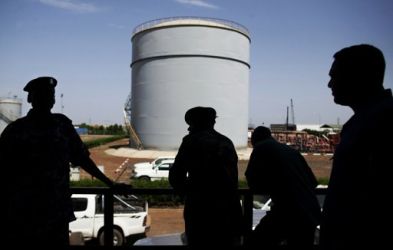Sudan seals new agreement with Petrodar on transit fees
June 28, 2014 (KHARTOUM) – The Sudanese government and Petrodar oil company signed an agreement on Saturday, by which the latter pays $19.8 per barrel of oil flowing from oilfields number three and seven in South Sudan that ends up in Port Sudan export terminal on the Red Sea.

Petrodar is a consortium comprised of five companies including China National Petroleum (CNPC), Malaysia’s Petronas, Sudan’s Sudapet, China’s SINOPEC and Kuwait’s Tri-ocean Exploration and Production.
It operates in oilfields located in South Sudan’s Upper Nile state.
Khartoum and Juba were locked in a dispute over oil transit fees which led to the suspension of oil production in South Sudan. The issue was resolved in March of last year.
The Sudanese oil minister Makkawi Mohamed Awad said in press statements on Saturday, following the signing of the agreement, that his country’s efforts succeeded in persuading its partners in these oil companies to boost the transit and processing fees.
He disclosed that Petrodar agreed to raise transit fees to $4 from $1, and tariffs from $5.5 to $19.8 adding that the company wanted to help Sudan offset the loss of South Sudan’s oil following its independence in July 2011. The agreement will expire in 2017.
Awad said three more agreements will follow in the next two weeks regarding payment methods and other financial technicalities. This pact will also help resolve debt owed by Khartoum to several oil companies and other international organizations.
Half of the proceeds will be used to pay off the debt and the remaining half will go into Sudan’s treasury, he added.
Sudan owes CNPC $1.3 billion which represents the value of oil the government bought from it since the country’s breakup up till end of 2013.
The Sudanese official said that currently 200,000 barrels of oil pass through these pipelines on a daily basis from South Sudan. However. But other reports puts the figure at 150,000 particularly after the outbreak of the conflict in South Sudan.
The minister praised the support of these oil partners as well as China and Malaysia to his country. He also that these companies will continue their exploration efforts the town Kosti and the Blue Nile state in blocs 7 and 8.
The Sudanese state minister of Finance Abdulrahman Dirar said the agreement will contribute to improving the Sudanese pound exchange rate against foreign currencies.
He said that his country will work to employ the proceeds from the deal, according to current priorities to support productive sectors and infrastructure.
Sudan lost three-quarters of its oil production when South Sudan became independent , worsening an economic crisis as oil was the government’s main source of revenue, providing the cash flow to fund food imports and other basic items.
(ST)
